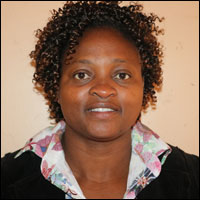Judith Adhiambo Pete, PhD student at the Open University, explored whether and under what conditions the use of OER might benefit students and teachers at universities and all interested citizens in three Sub-Saharan countries. The PhD defense will take place on Thursday 12 September 2019 13:30 pm, at the Open University in Heerlen.
The potential of Open Education Resources
Pete: 'Based on my own experiences as a child in rural Kenya, as a teacher and as researcher I got confronted with the urgent need to access knowledge without boundaries. OER is in my opinion part of the solution.'
OER refer to a whole range of information that is available on the internet and other online networks for education. It is referred to as ‘open’ because anyone can create and upload, and because accessing these is free. Pete: “OER is seen to offer endless possibilities for Sub-Saharan African universities by reducing costs of education, improving quality of education, as well as increasing access to quality education for all. However, Sub-Saharan African universities, are notably underrepresented in the literature, especially on differentiations, be it on access to or use and sharing of OER.”
OER differentiation is a term that is vital in her study. It is defined as the existing inequalities in the use of OER in society, that involves not only unequal access to OER, but goes further to include the inequalities that exist between groups of people in their ability and capability to actually create, use or re-use, repurpose, and holistically utilize OER for individual and common good among others.
How to realize the potential
Pete’s thesis synthesizes research carried out to develop a representative view of OER in three Sub-Saharan countries: Kenya, Ghana and South Africa, examining a deliberate selection of twelve universities across the three countries. Pete: 'My research, which formed part of the Research on Open Educational Resources for Development project, explores differentiation in terms of digital proficiency, level of use of OER, awareness of licensing and the perceived value of OER.
Major findings from the research are that there is a significant digital differentiation among lecturers and students in terms of their proficiency, devices used and internet accessibility. Moreover, the awareness and appreciation of the OER concept and open licensing is generally low. Pete: 'There is a preparedness towards openness in the future in all the three countries. In order to increase the quality of education in Africa, there is need to integrate OER and ICT in teaching and learning in universities so that students, lecturers and researchers can easily access, use, re-use, re-purpose, create and share them freely.'
In the end, universities can use these research insights in considerating how to restructure their educational policies to incorporate OER in teaching and learning to enhance the quality of education.
Promotion
Judith Adhiambo Pete defends her thesis 'Open Education Resources Differentiation: A Cross-country study on Differentiation in Access, Use and Sharing of (Open) Educational Resources at Universities in Kenya, Ghana and South Africa’ on Thursday 12 September 2019 at 13:30 pm at the Open University in Heerlen. The supervisors are prof. dr. H.M.J. van den Bosch (Open University), prof. José Dutra de Oliveiro Neto (University of Sao Paulo) and dr. Jos Rikers (Open University). Her defense will be streamed online via www.ou.nl/live.

Judith Adhiambo Pete
